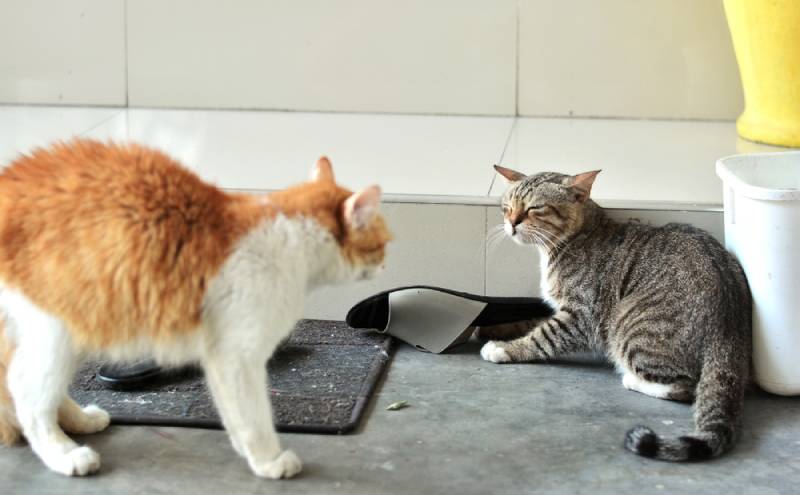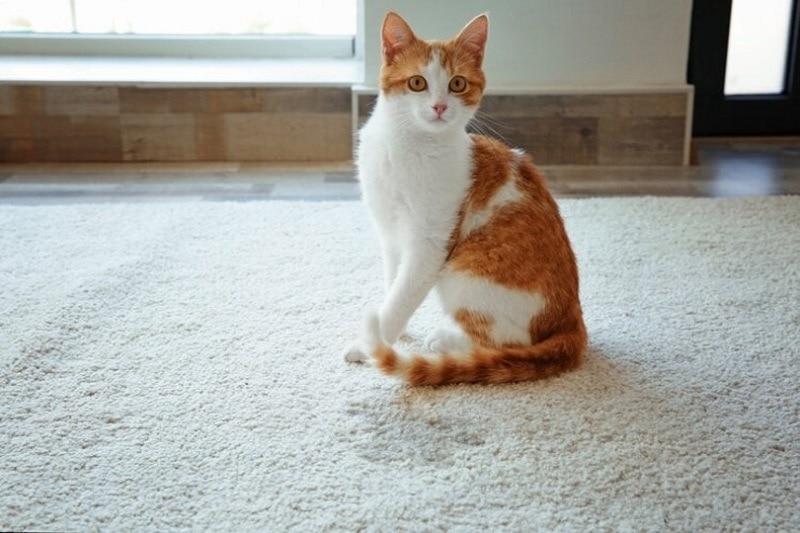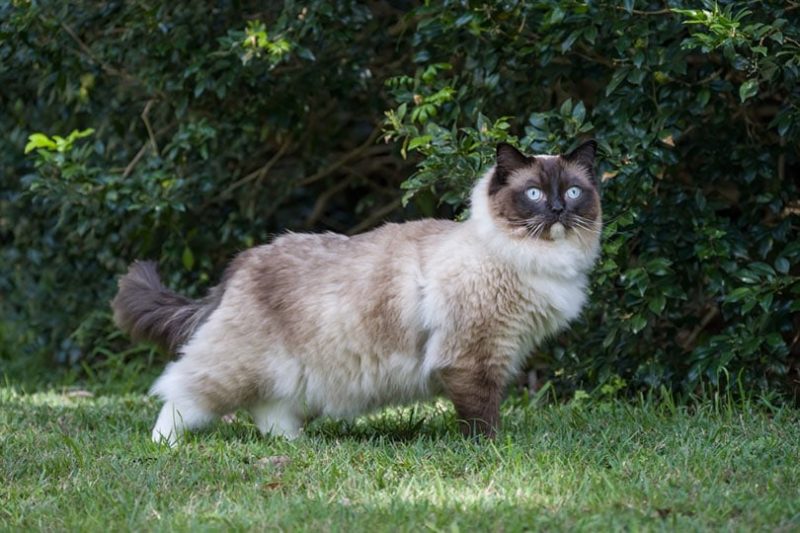Russian White (Russian Black, Russian Tabby): Breed Info, Pictures, Temperament & Traits
Updated on
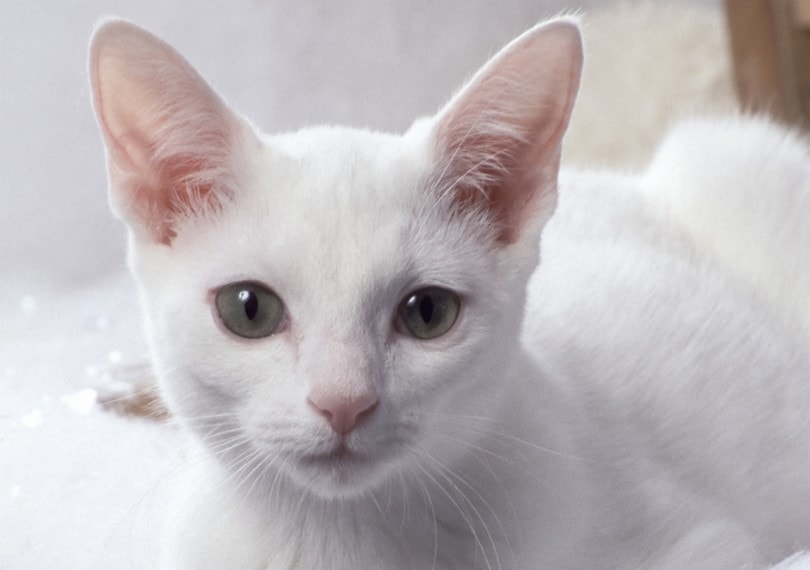
| Height: | 8–10 inches |
| Weight: | 6–12 pounds |
| Lifespan: | 10–20 years |
| Colors: | White, black |
| Suitable for: | Laid-back families who have time to snuggle their kitty |
| Temperament: | Playful as a kitten, extremely intelligent but can be a bit reserved as an adult |
Not to be confused with the White Russian Vodka drink, a Russian White is a cat that likes to unwind and have a good time. They tend to be very laid-back, affectionate creatures who would rather bask in the glow of your love than chase down a lizard. The kittens are playful, and they grow up to be extremely intelligent although somewhat lazy animals.
The Russian White originated from a mix between the Russian Blue and a white Siberian cat, with the Russian Black and Russian Tabby also originating from this same breeding. The breed has only been around officially since 1971, and it’s still considered rare in the United States. You might have to go through quite a bit of trouble (and expense) to find one.
However, if a relaxed, friendly feline sounds like the cat for you, the Russian White (or Russian Black or Tabby) might be worth the effort. These cats are all very similar in their personality and temperament, so what applies to one of these variations typically applies to the others as well.
Russian White Kittens
Because Russian White kittens are still considered a rare breed, their price ranges greatly and can be quite expensive. However, you could get lucky and find one at the shelter or from a rehoming situation. It’s also possible to find a Russian mix that would be cheaper than a purebred.
3 Little-Known Facts About the Russian White
1. They originated from Australia.
Despite the country of its namesake, this breed started in Australia from a breeding program that combined the Russian Blue with the Siberian. All of these cats are different variations that resulted from the same breeding.
2. The breed is still fairly new, so purebreds are rare.
This breed was officially named in 1971, which means it just turned fifty. Russian Whites, Russian Blacks, and Russian Tabbies are hard to come by in the United States, and you’ll pay a pretty penny if you get one from a breeder.
3. They are considered to be one of the most laid-back cats.
Although most felines enjoy sunbathing and reclining on plush blankets, the Russian White takes the title of the most relaxed of felines. Fortunately, they also are one of the most snuggly breeds, so they don’t always take their siestas alone.
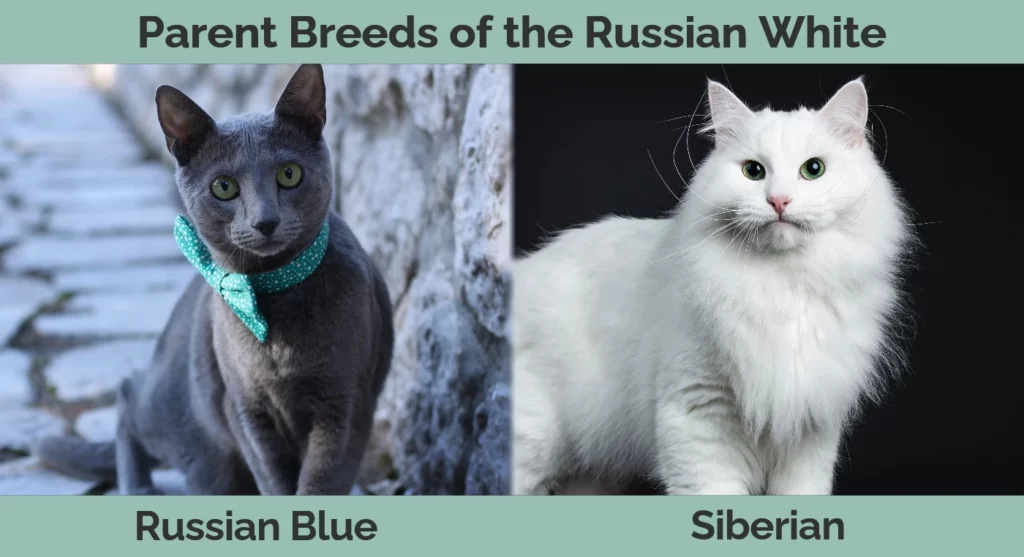
Temperament & Intelligence of the Russian White
The Russian White likes to make their home calmly and quietly in the midst of people. Unlike some cats such as the orange tabby, this cat doesn’t like to talk or sing very much. While this is a very social breed, it’s so quiet you might not even notice it’s in the room.
These cats are extremely intelligent but use their smarts to study you instead of learning tricks. Called the canine of cats, the Russian White, as well as Russian Blacks and Russian Tabbies tend to bond with one special human of its choosing and will follow them around with all the loyalty commonly expected from a dog.
Are These Cats Good for Families? 👪
These cats are good for families who like to stay at home and relax because they make great snuggle buddies. This kitty thrives on being around people and will get bored if left by itself for most of the day. They also aren’t fond of change and prefer a household that doesn’t move a lot.
However, the Russian White will probably adapt to most any lifestyle as long as it doesn’t have to participate in group exercise.
Does This Breed Get Along with Other Pets?
All variations of this breed like to take it easy and live life in the slow lane. They tend to be very tolerant of other pets as long as they’re not being overly obnoxious. Of course, we don’t recommend bringing a Russian White, or any cat, into a house with small pets that could potentially become prey, such as mice or hamsters.
Though the Russian White isn’t a very active and mischievous breed, you never know what they might try if they get too bored.
Things to Know When Owning a Russian White, Black, or Tabby:
Food & Diet Requirements 🐡
Though there aren’t any breed-specific food requirements, we do advise you to keep an eye on your pet’s weight and feed them accordingly. Russian Whites have a particularly hard struggle with obesity, mostly because they aren’t very active. We recommend avoiding a high-calorie or high-protein diet that might make them pack on the extra pounds, especially as they get older.
Other than obesity considerations, these cats can eat wet or dry food of your choosing depending on their life-stage and what you can afford.
Exercise 🐈
While these cats aren’t considered to be the most playful breed, they can have a good time if you give them cat toys and a scratching post. Exercise is crucial to maintaining a healthy weight, which is something the breed tends to struggle with since they’re so relaxed. The good news is a mere 15 minutes of activity per day is generally enough to keep your cat fit.
Having another kitty in the house can encourage your Russian White to play as well as bond with another animal.
Training 🧶
These cats are incredibly smart but don’t expect them to use their intellect to learn trendy tricks. They don’t usually learn basic commands such as sit. However, they’re quick learners when it comes to practical life skills like how to use a litter box.
Grooming ✂️
Russian Whites are short-haired cats that require very little maintenance when it comes to grooming. Luckily for allergy sufferers, they don’t shed as much and their fur is thicker than some other short-haired breeds. People with cat allergies are actually allergic to the dander and saliva rather than the fur. Because of these cats’ thick fur and low shedding, the allergens don’t have a chance to travel around the house as much because they get trapped in their coat.
However, you’ll need to brush their fur at least once a week to distribute their natural oils through their coat. You also might want to consider bathing your Russian cat at least once a month. Starting a bathing routine while they’re still a kitten will help them become accustomed to bath time and reduce the cat’s notorious fear of water.
Health and Conditions 🏥
- Bladder Stones
- Obesity
The Russian White is a healthy breed with very few overall health concerns. Of course, every cat’s health is different, and their condition will mostly depend on the individual animal. On the whole, though, it’s believed that Russian Whites have few genetic health issues and are expected to live a long life, up to 20 years.
Obesity is the biggest health issue for the breed. Because they tend to be very chill cats, their health can suffer from lack of exercise. If you notice your cat gaining an exorbitant amount of weight, cut their calories and introduce new toys and scratching posts to encourage play. While obesity may not seem very serious, it can lead to life-threatening health conditions as it becomes more strenuous for your cat to move around, leading them to become even more sedentary than they’re already prone to be. Cancer, arthritis, and diabetes are some common risks when a cat is chronically obese. Bladder stones are another increased risk, which unfortunately the Russian White is also likely to develop.
These cats have a higher chance of developing bladder stones, mineral deposits that form in their urinary bladder. If these stones become an obstruction, your cat may require emergency surgery. If your cat only has small stones that haven’t completely inhibited their ability to urinate, your vet may try to eliminate the stones by dissolving them with a special diet instead of operating.
Male vs Female
As with most animals, male Russian Whites tend to be bigger than females. While your cat’s temperament will depend on them personally more than gender stereotypes, males also generally like to play more than females. Russian White girls are snowy white queens who will usually enjoy a soft snuggle more than a game of chase.
Final Thoughts
If you’re looking for a regal, docile creature with a caring heart, a Russian White, Black, or Tabby cat could be the cat for you. If they choose you as their human, you will be their closest friend and they will be your most loyal compadre. Due to their thick, short coat, these cats don’t shed as much as some cats and are considered a more allergy-friendly option. They are low-shedding and easy to maintain. If you provide weekly brushing and monthly baths, they’ll take care of the rest of their beauty routine.
Genetically, this breed has few underlying health concerns. You’ll have to watch out for obesity, which can contribute to bladder stones, their milder health condition.
On the whole, the Russian White is a very loving, loyal breed that comes with a big price tag. If you’re fortunate enough to find one, you’ll have a friend for life.
Featured Image Credit: Clement Morin, Shutterstock



